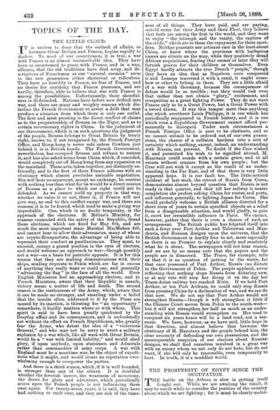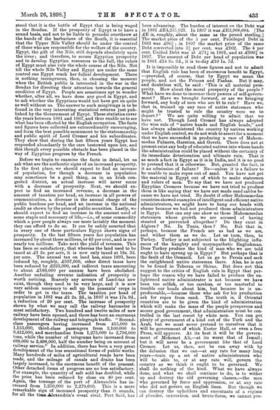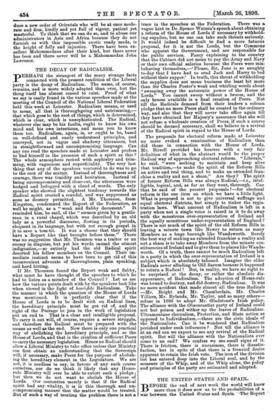THE PROSPERITY OF EGYPT SINCE THE OCCUPATION.
THE battle on the Atbara is slow in getting itself fought out. While we are awaiting the result, it may be worth while to consider the position of the country about which we are fighting ; for it must be clearly under- stood that it is the battle of Egypt that is being waged in the Soudan. If the prosperity of Egypt is to have a sound basis, and not to be liable to periodic overthrow at the hands of the barbarians of the South, it is essential that the Upper Nile Valley should be under the control of those who are responsible for the welfare of the country. Egypt, the gift of the Nile. still depends absolutely upon the river; and therefore, to secure Egyptian prosperity and to develop Egyptian resources to the full, the rulers of Egypt must also rule the whole course of the Nile. Not till the whole Nile Valley and Egypt are under the same control can Egypt reach her fullest development. There is nothing incongruous, then, in choosing the moment when the British public is interested in the war in the Soudan for directing their attention towards the general condition of Egypt. People are sometimes apt to wonder whether, after all, we have done any good in Egypt, and to ask whether the Egyptians would not have got on quite as well without us. The answer to such misgivings is to be found in the very interesting statistical returns just pub- lished by the Government of Egypt. These statistics cover the years between 1881 and 1887, and thus enable us to see what has been effected by the English occupation. The facts and figures here collected are extraordinarily encouraging, and form the best possible monument to the statesmanship and public spirit of Lord Cromer and his subordinates. They show that during the last fifteen years Egypt has responded abundantly to the care bestowed upon her, and this though every possible obstacle has been placed in the way of Egyptian progress by the French.
Before we begin to examine the facts in detail, let us ask what are the authentic signs of an increased prosperity. In the first place, we should expect to find an increase of population, for though a decrease in population may sometimes be a good thing, as in an Irish con- gested district, an actual increase will never occur with a decrease of prosperity. Next, we should ex- pect to find an increased revenue, a decrease in the amount of taxation per head, an increase in all powers of communication, a. decrease in the annual charge of the public burdens per head, and an increase in the national credit as shown by the price of public securities. Lastly, we should expect to find an increase in the amount used of some staple and necessary of life,—i.e., of some commodity which a poor people always use more lavishly the moment they can afford to do so. It can be safely asserted that in every one of these particulars Egypt shows signs of prosperity. In the last fifteen years her population has increased by about three millions, or 43 per cent., and is now nearly ten millions. Take next the yield of revenue. This has been so satisfactory, that whereas the land used to be taxed at .21 2s. per acre, it is now only taxed at 18s. 3d. per acre. The annual tax on land has, since 1891, been reduced by, roughly, £507,600, other direct taxes have been reduced by £223,000, and indirect taxes amounting to about .2186,000 per annum have been abolished. Another unfailing revenue indication of prosperity is worth noticing. Scarcely any arrears of Land-tax now exist, though they used to be very large, and it is now very seldom necessary to sell up the peasants' crops in order to get in the taxes. The taxation per head of population in 1881 was .21 2s. 2d., in 1897 it was 17s. 9d., a reduction of 20 per cent. The increase of prosperity shown by what we may call the railway barometer is most satisfactory. Two hundred and twelve miles of new railway have been opened, and there has been an enormous development of the railway and telegraph traffic. "Second- class passengers having increased from 415,000 to 1,153,000, third-class passengers from 3,100,000 to 9,412,000, and merchandise from 1,275,000 to 2,796,000 tons, while the number of telegrams have increased from 688,000 to 2,498,000, half the number being on account of railway service." In addition, there has been a very great development of the less sensational forms of public works. Many hundreds of miles of agricultural roads have been made, and the mileage of canals and drains has been largely increased, to the enormous benefit of the peasant. Other detached items of progress are no less satisfactory. For example, the quantity of salt sold has doubled, while the price has been reduced by close on 40 per cent. Again, the tonnage of the port of Alexandria has in- creased from 1,250,000 to 2,270,000. This is a more remarkable sign of increased prosperity than it sounds, for all the tuna Alexandria's reat rival. Port Said, has been advancing. The burden of interest on the Debt wart in 1881 .2E4,235,921. In 1897 it was .2E3,908,684. [The LE is, roughly, about the same as the pound sterling.] The market price of the 5 per cent. Privileged Debt in 1881 was .296i ; in 1897 the market price of the same Debt converted into 31 per cent. was .2102. The 4 per cent. Unified Debt was at .271f in 1881, and at .21061 in 1897. The amount of Debt per head of population was in 1881 £14 8s. 9d., it is to-day .210 is. 7d.
It is impossible to read these figures and not to admit that English rule has been of enormous benefit to Egypt, —provided, of course, that by Egypt we mean the people, and not the Princes and Pashas. But it may, and doubtless will, be said : This is all material pros- perity. How about the moral prosperity of the people ? What have we done to increase their powers of self-govern- ment? Have we brought forward, or are we bringing forward, any body of men who are fit to rule ? Have we, that is, trained up any race of native statesmen who might be trusted to rule the country were we to depart ? ' We are quite willing to admit that we have not. Though Lord Cromer has always adopted the wise rule of "native hands and English heads," and has always administered the country by natives working under English control, we do not wish to assert for a moment that we have succeeded in producing a race of Mahom- medan Palmers, Garstins, and Gorsts. There does not at present exist any body of educated natives into whose hands the administration could be placed without the certainty of its immediate deterioration and ultimate ruin. That is as much a fact in Egypt as it is in India, and it is no good to pretend that it is otherwise. But, granted the fact, is it an admission of failure ? No—unless it is a failure to be unable to make ropes out of sand. You have not got the material in Egypt out of which to make statesmen and rulers of men. To say that we have not produced Egyptian Cromers because we have not tried to produce them is like saying that we have not made sand cables be- cause we have not tried. No doubt if other Mahommedan countries showed examples of intelligent and efficient native administrators, we might have to hang our heads with shame because we had not produced those administrators in Egypt. But can any one show us these Mahommedan statesmen whose growth we are accused of having stunted or prevented altogether ? Do they exist in Algiers ? No. In Tunis, then ? No. But that is, . perhaps, because the French are as bad as we are, and wither them as we do. Let us turn, then, to Turkey. Turkey is not subjected to the blighting influ- ences of the haughty and unsympathetic Englishman. Does Turkey produce the kind of man who we are told ought to have sprung up in Egypt ? But perhaps that is the fault of the Osmanli. Let us go to Persia and seek the enlightened native statesman there. Alas, he is not to be found in Teheran or Shiraz. But does not this suggest to the critics of English rule in Egypt that per- haps the reason why we have failed to produce the en- lightened native administrator is not because we have been too selfish, or too careless, or too masterful to trouble our heads about him, but because he is un- produceable,—because those who ask for his production ask for ropes from sand. The truth is, if Oriental countries are to be given the kind of administration which will make the mass of the people prosperous and secure good government, that administration must be con- trolled in the last resort by white men. You can get plenty of government of a kind out of the Turk and the Arab, but we must never pretend to ourselves that it will be government of which Exeter Hall, or even a free Press, will approve. At its best it will be the govern- ment of Mehemet Ali,—at its worst that of Ismail ; but it will never be a. government like that of Lord Cromer. Let us, then, not be run away with by the delusion that we can—at any rate for many long years—train up a set of native administrators who will be able to, or at any rate will, govern the country as we think it ought to be governed. We shall do nothing of the kind. What we have always done, and. what we shall continue to do, is to wither up and destroy the old governing classes,—the men who governed by force and oppression, or at any rate who did not govern on English lines. But though we can destroy the upholders and executants of a regime of plunder, oppression. and brute-force, we cannot pro- duce a new order of Orientals who will be at once mode- rate and firm, kindly and yet full of vigour, patient yet masterful. To think that we can do so, and to abuse our administrators in Asia and Africa because they do not furnish us with this impossible exotic ready made, is the height of folly and injustice. There have been ex- cellent Mahommedans after their kind, but there never has been and there never will be a Mahommedan John Lawrence.








































 Previous page
Previous page